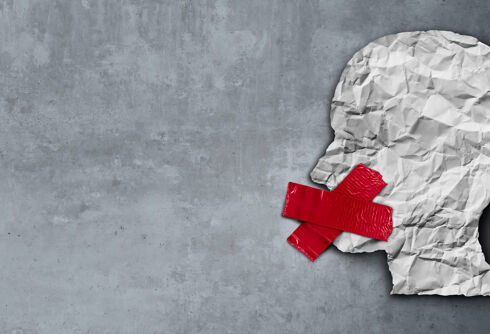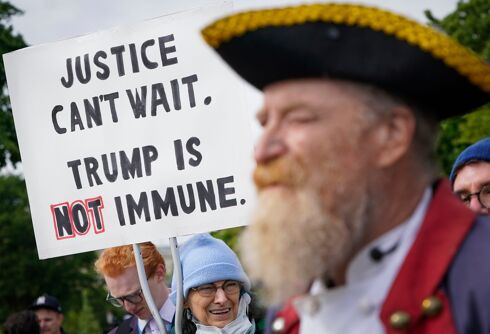Today marks the 100th day of the Joe Biden presidency. While it’s an artificial marker, the date is an opportunity to note what Biden and Vice President Kamala Harris have done in their first three months in office when it comes to LGBTQ issues.
The short answer: a lot.
Related: Concerned father arrested while peacefully testifying against Arkansas trans health care ban
Much of the work that Biden undertook when entering office was undoing all the damage that Donald Trump did.
Never Miss a Beat
Subscribe to our newsletter to stay ahead of the latest LGBTQ+ political news and insights.
“There was a lot of damage done by the Trump administration in four years, particularly in the final months,” says Sharon McGowan, chief strategy office and legal director of Lambda Legal. “They were setting fire to everything they could get their hands on.”
Biden began tackling LGBTQ issues on Inauguration Day, when he signed a sweeping executive order, instructing executive agencies to interpret federal civil rights legislation as already banning discrimination against LGBTQ people in many areas of the law.
“All persons should receive equal treatment under the law, no matter their gender identity or sexual orientation,” the executive order states in the introduction.
Harris deserves her share of credit for the administration’s progress. With less fanfare, Harris has been a crucial partner in promoting LGBTQ rights.
The president’s initial moves were a clear signal about the administration’s commitments.
“The executive order was very important to see on day one to reset and recalibrate the federal government,” says McGowan.
That was quickly followed by following through on Biden’s campaign pledge to end the ban on transgender military personnel. The ban officially ends tomorrow but was unofficially repealed shortly after Biden took office. To underscore the change in attitude, the Pentagon formally announced the new policy on Transgender Day of Visibility, March 31.
At the same time, Biden has been populating the federal government with a diverse set of nominees, including some groundbreaking appointments. Pete Buttigieg became the first out gay Cabinet member. Dr. Rachel Levine became the first transgender person confirmed by the Senate, as assistant secretary at the Department of Health and Human Service.
Other nominees include Gina Ortiz, a veteran and out lesbian, as undersecretary of the Air Force; Chris Magnus, the first gay police chief to be married in the U.S., as head of Customs and Border Patrol; and Brenda Fulton, a lesbian and West Point graduate, as an assistant secretary of defense.
Biden hasn’t stinted on using the ceremonial powers of the White House to bolster LGBTQ awareness. He issued a presidential proclamation on Transgender Day of Visibility and issued a blanket authorization for embassies to fly the Pride flag.
Biden also had a shout-out to the LGBTQ community in his speech to the joint session of Congress last night, with a particular note for trans youth, who are targeted by a rash of GOP-sponsored anti-trans legislation.
“For all transgender Americans watching at home, especially young people, you want to know your president has your back,” Biden said.
Amazingly, Biden’s progressive policies have generated little attention from the general public, let alone pushback. That’s the case not only for LGBTQ rights but more broadly on his expansive economic policies, emphasis on climate change, and focus on racial equity.
In part, that’s because of Biden’s personality. Biden is both non-threatening and well-known.
“So much of this is about Joe Biden himself,” says McGowan.
Republicans have struggled to figure out whether to call Biden a communist or a dementia patient. Trump came up with the feeble nickname “Saintly Joe Biden.” Calling Biden a saint, even ironically, shows just how hard it is to make Biden a villain.
But Biden has also been consciously low-key, making sure that he’s not the story. The Washington press corps hates that Biden keeps the performative media appearances to a minimum, but politically it’s proven a smart move.
As strong as Biden’s start has been, it’s far from perfect. The main disappointment is Biden’s inability to fulfill his promise to sign the Equality Act in his first 100 days. That failure shows the limits of his powers.
It’s up to Congress to pass bills that Biden can sign into law. But the evenly divided Senate is encumbered by a filibuster process that requires 60 votes to pass virtually everything. Getting 10 Republicans to sign onto the Equality Act is virtually impossible. As long as Democrats Joe Manchin and Kyrsten Sinema protect the filibuster, nothing can pass by simple majority, including the Equality Act.
Biden’s work is hardly done. As McGowan notes, the damage caused by the Trump administration is deep and will take a long time to unwind.
Still, Biden’s scorecard for the first 100 days is impressive. If you want proof, look no further than Tony Perkins, head of the hate group Family Research Council. Perkins says that Biden’s first 100 days feel “like an eternity.”
“Some of Biden’s most devastating decisions in these early days have been rolling back — or completely annihilating — Donald Trump’s progress on key issues,” Perkins complains.
That’s unintentional high praise, indeed.














Joe Biden has made a lot of progress on LGBTQ rights in first 100 days. Now the Senate needs to act.